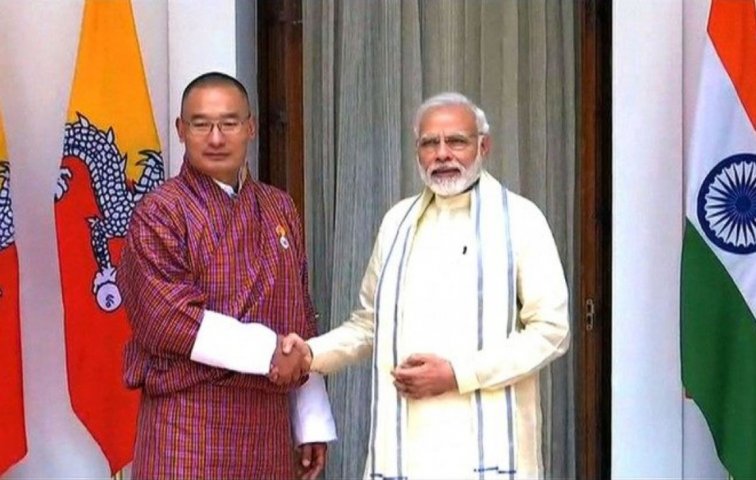
By Nava Thakuria 27 December 2018
As a reciprocal gesture, Bhutan’s newly elected Prime Minister Dr Lotay Tshering is visiting India with a three-day official visit schedule from 27 December. During his visit, the Druk Prime Minister is expected to call on Indian President Ram Nath Kovind and vice-President M. Venkaiah Naidu besides discussing with his host counterpart Narendra Modi on various bilateral issues.
The trip signifies the importance of Indo-Bhutan relationship as it is Dr Tshering’s first official visit to abroad after taking the rein of Royal Government in Thimphu. It is reciprocal in nature as Modi too paid his first official visit to Bhutan after getting sworn in as Prime Minister of India in 2014.
India’s foreign ministry, in a recent media release, stated that Dr Tshering’s visit is taking place during the golden jubilee year of Indo-Bhutan diplomatic relationship as both the neighboring countries enjoy exemplary ties of friendship and cooperation, based on utmost trust, goodwill and mutual understanding at all levels.
“The upcoming visit of PM Dr Tshering will provide an opportunity to both the sides to review the progress in the multifaceted partnership and to discuss ways and means to expand the enduring ties of friendship and cooperation for the benefit of the citizens in both the countries,” added the media release.
Bhutan had recently witnessed the third national elections, held in October 2018, where Dr Tshering’s party named Druk Nyamrup Tshogpa (DNT) emerged winner. A practicing physician successfully nurtured supports from 438,663 registered electorate (out of total 735,553
Population) in the electoral battles and become third Prime Minister of the south Asian nation.
Sandwiched between two giant nations India and Tibet (now under China), the Buddhist nation was ruled by monarchs, when the Dragon King Jigme Singye Wangchuk himself proposed for transforming it for a democratic constitutional monarchy. The Druk democracy witnessed the first ever elections in March 2008 and prior to that Oxford educated Prince Jigme Khesar Namgyel Wangchuck was crowned as the ceremonial Head of the State.
Besides DNT, three more registered political parties namely People’s Democratic Party (PDP), Druk Phuensum Tshogpa (DPT) and Bhutan Kuen-Nyam Party (BKP) were in the fray. Led by Jigmi Y Thinley, DPT won the first national election of the Himalayan nation (also known as Druk Yul in Bhutanese or Land of the Thunder Dragon). But this time the party lost the poll battles.
In the 2013 national elections PDP emerged as the winner and Tshering Tobgay became the second Prime Minister of Bhutan. In the last polls his party too lost and DNT came to the front to form the government.
Tobgay was a dependable pro-India politician, but Dr Tshering was not known as a pro or anti India. During his poll campaigning, the doctor turned politician emphasized only on development issues for the Bhutanese nationals.
However, Dr Tshering has lately clarified that Bhutan’s policy towards India would not be changed. From the initiative of Bhutan’s fourth Wangchuck dynasty king Jigme Singye Wangchuk, his nation got inspiration to embrace New Delhi as a trusted neighbor. The present king Jigme Khesar follows the spirit saying that India is a special friend to Bhutan.
Bhutan PM is expected to discuss various bilateral issues with his Indian counterpart during his visit. Among them, the budget for 12th five-year plan and New Delhi’s assistance during the plan would be prioritized. Moreover the increase of electricity export tariff would also be in the priority list for Bhutan, as its revenue generation is seemingly dependent on the levy for 720-megawatt Mangdechhu hydropower project.
Notably, New Delhi provided rupees 45 billion along with rupees 5 billion as financial incentives to Bhutan during its 11th plan (2013-2018). At the same time, the hydroelectricity projects in south Bhutan have been patronized by India, where most of the products (electricity) are consumed by the giant neighbor as well.
“Led by the Kings who have guided our nation from monarchy to multi-party democracy, Bhutan stands firmly with India. When the Chinese annexed Tibet in the late 1950s, Bhutan sealed off its northern border. The visit of Pandit Jawaharlal Nehru in 1958 was a watershed moment for Indo-Bhutan relations, and since then Bhutan’s ties with India has remained firm,” said Gopilal Acharya, an acclaimed Bhutanese author and political commentator.
Speaking to this writer from Thimphu, Acharya pointed out that Indo-Bhutan kind of friendship and trust is important for resolution of conflicts like the one we saw in Doklam last year, when the Indian troops and China’s People’s Liberation Army personnel were engaged in a standoff for over two months.
The conflict started on 16 June 2017 at strategically important Doklam locality, which is in a tri-nation junction among Bhutan, India and China, following the Indian soldiers’ prohibition for constricting a road by the Chinese forces. Finally the Beijing administration asked its armed personnel to retreat and the issue was temporarily resolved on 28 August.
Beijing criticized New Delhi for its intervention at Doklam saying that ‘China-Bhutan border issue had nothing to do with India as a third party and it had no right to interfere in or impede the boundary talks between Beijing and Thimphu’. However, the Bhutan government supported India’s presence over the issue declining any land swap deal with Beijing.
The Thimphu based young writer also added that as a country floating the concept of Gross National Happiness to the world, Bhutan keeps the interests of its citizens paramount, be it for health, education or a clean environment, where India’s goodwill always remains a priority.
